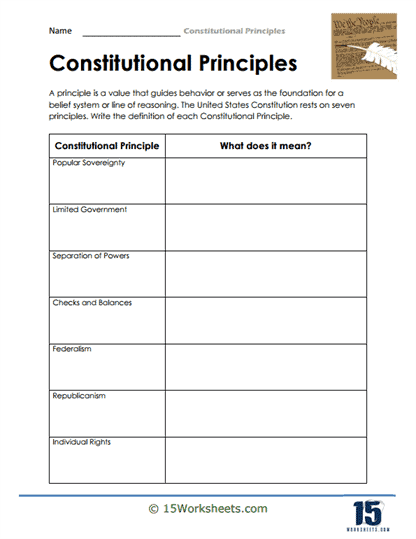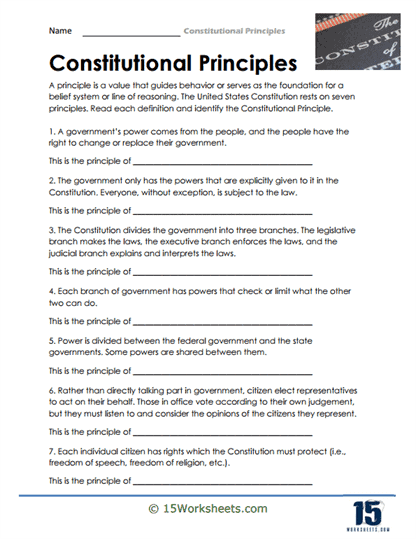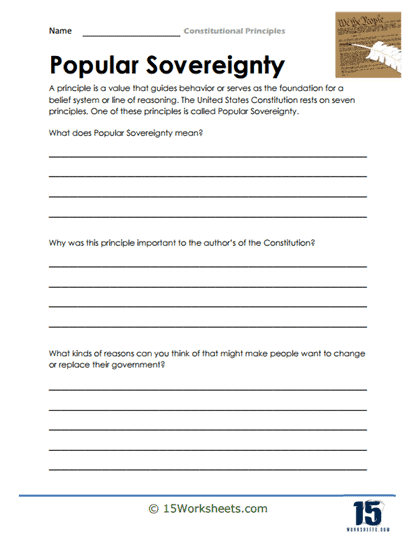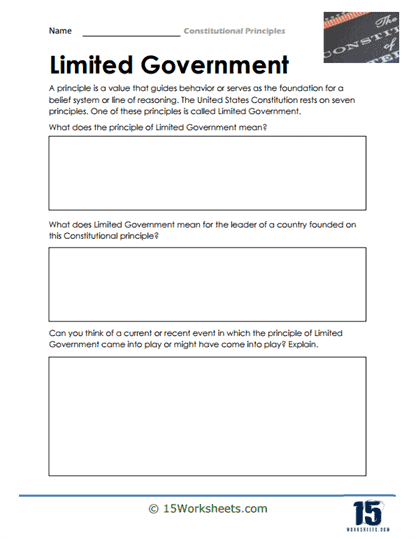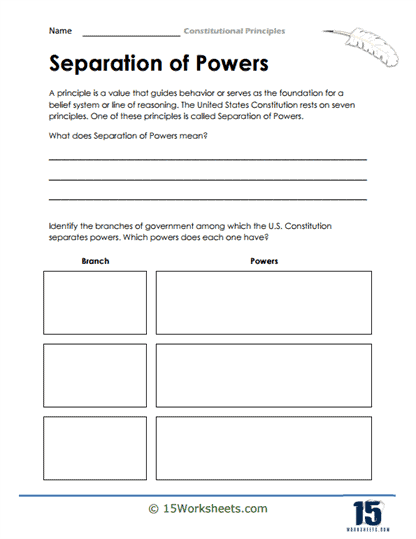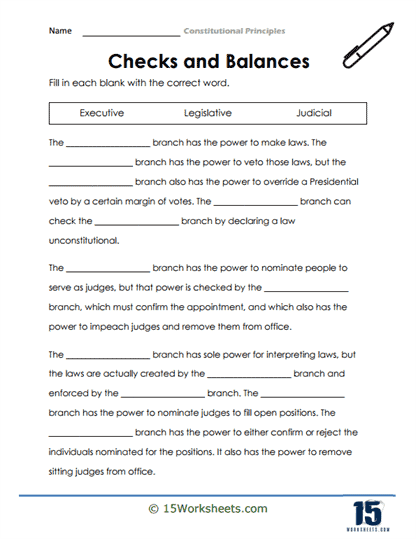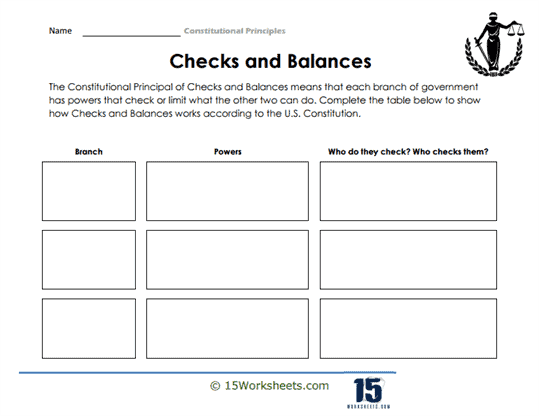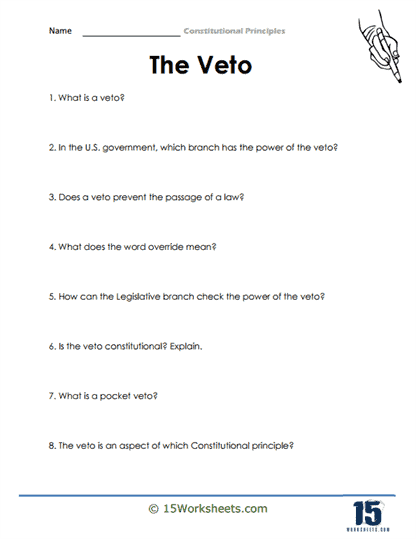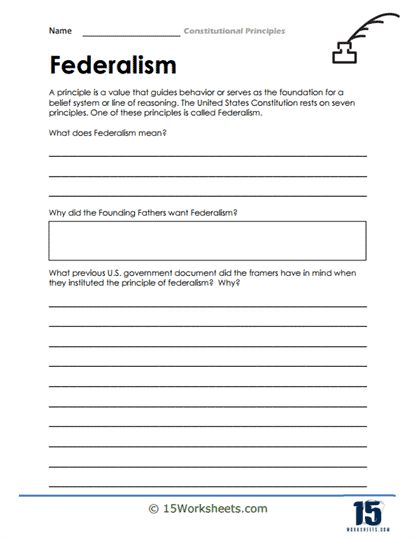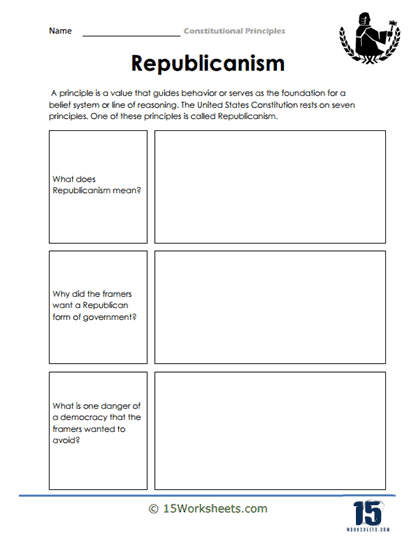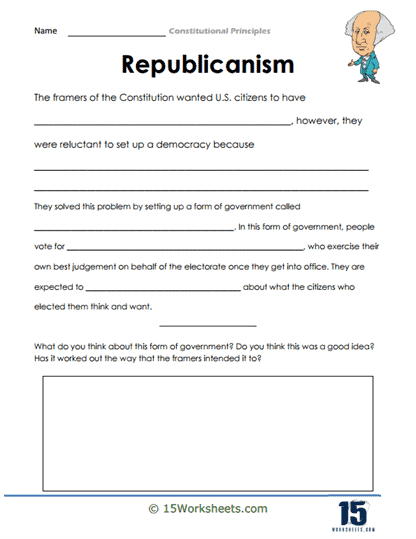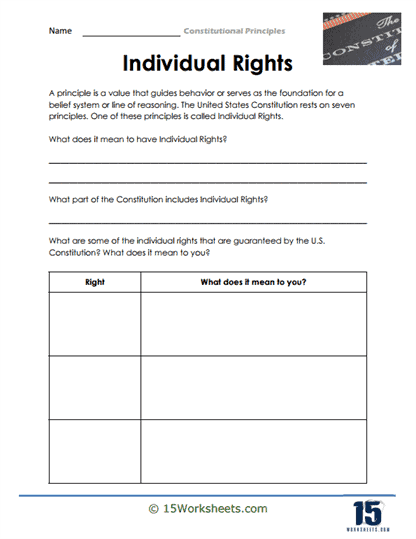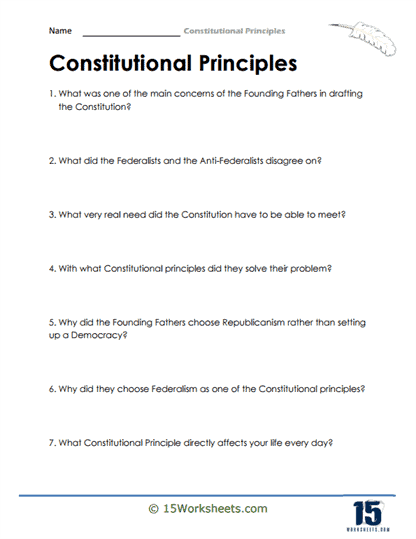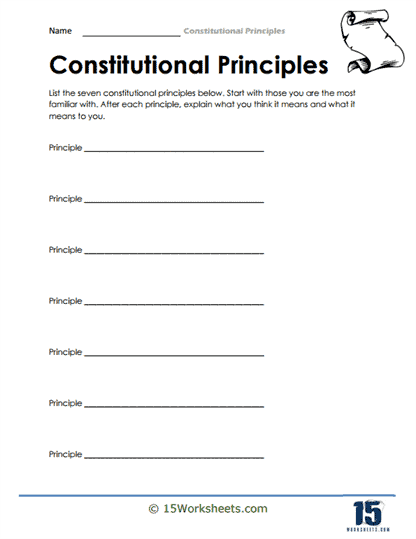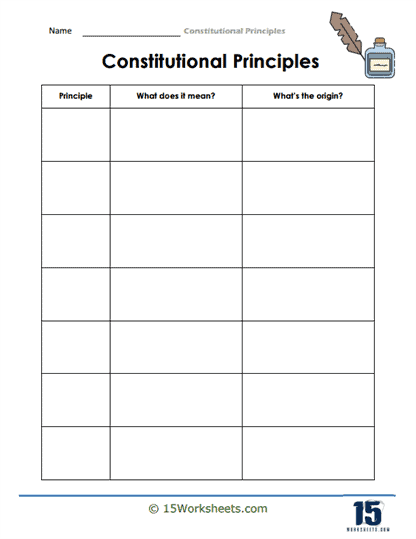Constitutional Principles Worksheets
All About These 15 Worksheets
This series of 15 worksheets covers the fundamental principles of constitutional governance. This collection is designed to introduce students to the core concepts and ideals that underpin modern democratic systems. Through various activities and thought-provoking exercises, students will gain a deeper understanding of the principles outlined in constitutions, their significance in safeguarding individual rights and promoting the rule of law, and their impact on the functioning of governments.
This series of worksheets will empower students to grasp the fundamental principles that shape constitutional governance. Through engaging activities and a wide range of exercises, students will develop critical thinking skills, a deeper appreciation for democratic principles, and an understanding of the rights and responsibilities of citizens in constitutional systems. Overall, this series aims to inspire students to actively participate in the democratic process, critically analyze the principles underlying constitutional governance, and become informed and engaged citizens in their own societies.
A Look at the Worksheets in the Collection
Starting with the “7 Key Constitutional Principles,” students are introduced to the foundational concepts that underpin the U.S. Constitution. It’s like meeting the Avengers of governance: Popular Sovereignty, Separation of Powers, Federalism, Republicanism, and Individual Rights. Each principle gets its moment in the spotlight, ensuring students grasp their significance in maintaining a balanced and fair government.
Delving deeper, worksheets like “Popular Sovereignty” and “Limited Government” challenge students to consider the power dynamics between the people and their leaders. They explore scenarios where the government’s power is derived from the consent of the governed, and where limitations are placed to prevent tyranny. It’s a thoughtful exercise that encourages students to reflect on the importance of accountability and citizen participation.
The “Separation of Powers” and “Checks and Balances Fill In” worksheets bring the three branches of government to life. Students might imagine a world where the legislative, executive, and judicial branches are roommates trying to share an apartment-each with their own responsibilities, but constantly checking on each other to ensure no one eats all the ice cream or passes unconstitutional laws. It’s a humorous yet effective way to understand the necessity of balance and oversight in governance.
Worksheets like “Veto Power” and “Unchecked Power” delve into the mechanisms that prevent any single branch from becoming too powerful. Students analyze real-life examples and hypothetical situations, considering the consequences of a president vetoing legislation or what happens when checks and balances fail. It’s a sobering reminder of the importance of vigilance and the potential pitfalls of complacency.
Finally, “Framers of the Constitution,” “Origin of Constitutional Principles,” and “Familiar Principles” provide historical context, allowing students to appreciate the foresight and debates that shaped the Constitution. They learn about the challenges faced by the Framers and how their decisions continue to influence modern governance. It’s a journey through time that connects past ideals with present realities.
What are Constitutional Principles?
A country stands on some fundamentals and must be followed by the government whose work is to follow the constitution. A country’s constitution means having precedents to help the ruling party better govern. There are some constitutional principles on which the constitution is based and amended by the public’s general vote.
Importance of Constitution
Constitution lays out the basic framework of the country and gives you an idea about what ideals are exercised in the country. It also protects the rights of all citizens. The constitution is always there to make the government more compliant. It explains the laws of society and gives the citizens power over the government. Furthermore, it upholds unity, provides stability, and enables the country to prosper.
Basic Constitutional Principles
There are seven constitutional principles: popular sovereignty, separation of powers, checks and balance, limited government, federalism, republican, and most importantly, individual rights.
Popular Sovereignty
In the past, monarchs that ruled over the kingdoms claimed that the power was invested in them by God; hence, their word was the law that the public must follow. However, as the revolution was brought upon, it had one goal that gave power to the people by saying, “We the people.” This gives the public right to abolish any government and shows it has authority over the government. It makes the ruling party answerable and accountable to the public.
Separation of Power
A chain of accountability is needed to limit the access of the government. The power of the country is divided into three houses. The legislative branch is the congress which passes the laws, has the power to override the president’s veto, has the authority to declare war, support armies, and impeach officials and the president. The executive branch is the president’s office; it carries out the laws and proposes laws.
It is responsible for carrying out federal officials’ appointments, and the president serves as the commander in chief and can offer presidential pardons. The third branch is the Judicial branch, which ensures the laws are implemented. It has the power to declare the laws or the executive decisions unconstitutional.
Limited Government
Before the constitution existed, the monarchs had unlimited power over their lands. Similarly, when American states were the colonies of the British Empire, they had to obey the rules the kingdom set no matter how unfair they were, like the Stamp Act or Intolerable Acts. When the declaration of independence was given, it was also decided that once the constitution was in place, no one must be above the law, not any president, judge, or solider.
Checks and Balance
All three offices have the rights that limit the power and access of the other two offices so that there is no abuse of power. This constitutional principle is known as checks and balance that safeguards the system.
Federalism
The power is further divided between the center, i.e., federal and the individual powers of the states. The federal government’s role is to guard the boundaries, declare war, look after the trades between the states, and regulate currency. In comparison, the states are responsible for making schools, holding state elections, and ensuring trade in the state.
Republicanism
Republicanism is when the public appoints representatives through elections to represent their stance. As the appointed ones settle in the office, they vote on laws and policies according to their judgment and what benefit they will bring to the people they represent.
Individual Rights
The most important constitutional right is the protection of an individual. This gives a citizen; a subject to the constitution, freedom of speech, protest, religious liberty, and a jury trial.

